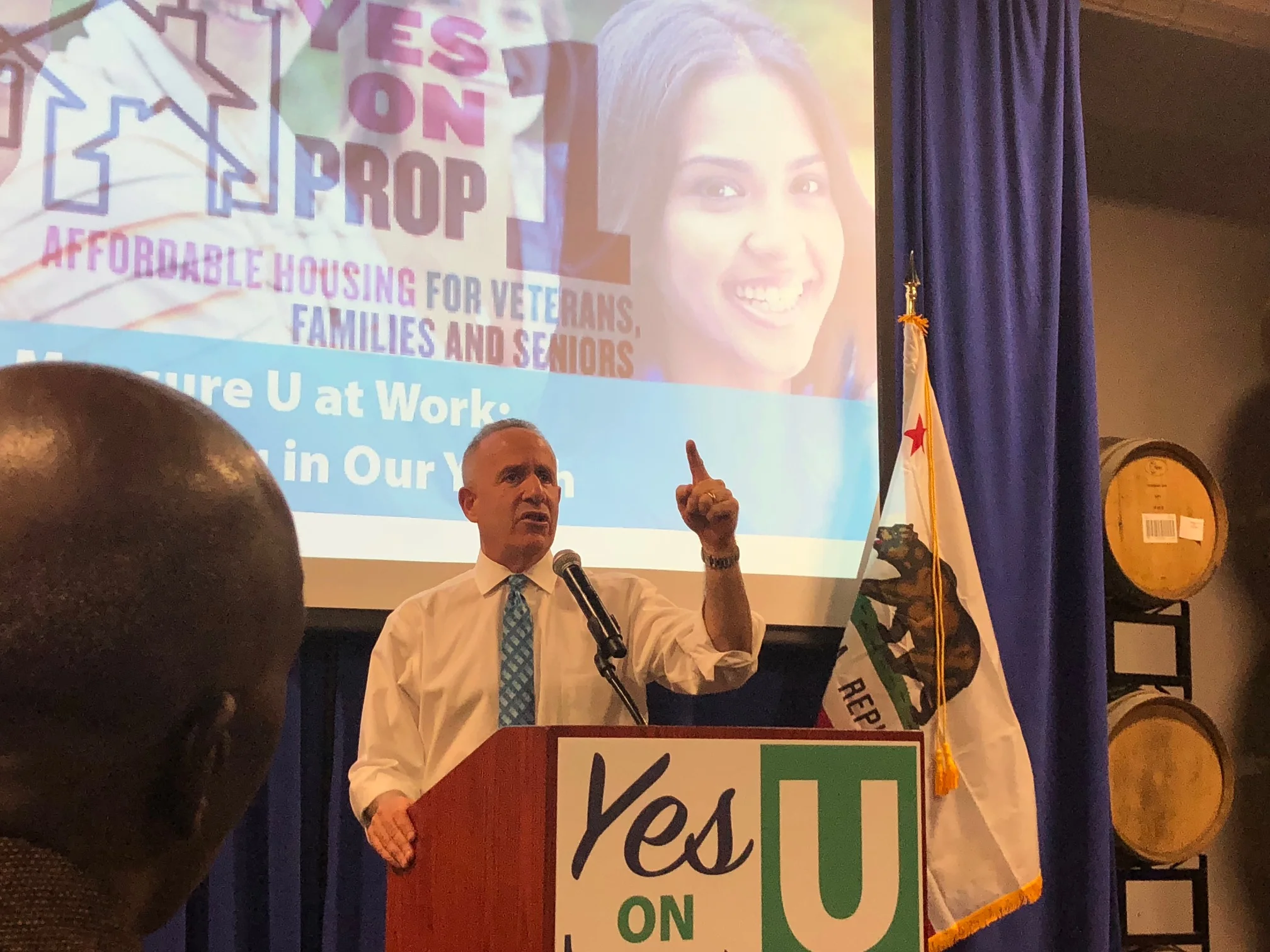Fans cheer Sacramento City Council's unanimous vote to approve stadium deal with Republic FC
Hundreds of Republic FC fans packed City Hall Tuesday as members of the Sacramento City Council voted unanimously to approve a deal with the team’s owners to build a privately financed stadium in The Railyards.
An investor group led by billionaire Ron Burkle plans to spend about $252.2 million to construct the stadium in The Railyards. It will also develop the 17 acres around the stadium site east of Seventh Street, for a total private investment of nearly $1 billion.
Mayor Steinberg gives the thumbs up at the Republic FC game on Saturday, April 6
Mayor Steinberg said the agreement is not only about sports, but is about “$1 billion worth of economic development investment in our city.”
“All of the sudden, this great extension of downtown is going to have life,” Mayor Steinberg said. “Imagine what that’s going to mean for our city and our tax base. This is just a great combination of so many things Sacramento wants and deserves.”
Councilmember Jeff Harris, whose district includes The Railyards, said he thinks development there will also help the adjacent River District, which he also represents. “I believe it will unlock potential and move our city forward in a very significant way,” he said.
Fans turned out in force to send a clear message of support both to the City Council and to Major League Soccer, whose board meets later this month in Los Angeles. All of the current Republic FC players also attended. The agreement between the Republic FC investors and the City is contingent on the team being awarded an MLS franchise.
“We’ve done all the League asked for and more…..and now is the time to deliver to this proud city the good news it deserves,” Mayor Steinberg said.
Matt Alvarez, a Hollywood film producer who has signed on with Burkle as a major investor in the Republic FC, said “it’s clear there’s no better fan base than right here in Sacramento.”
Soccer fans and supporters packed the City Council chambers before the vote.
“Given the size of the greater Sacramento region, its diverse population, growth economy, high levels of soccer participation and vibrant leaders, there is no better fit for MLS, and I have no doubt in my mind if will be a massive success,” Alvarez added.
The City’s John Dangberg said 90 percent of the drawings needed to start construction are done, meaning building could begin in six months. He said the stadium would have an open-air design similar to that of Golden 1 Center.
The team owners have also agreed to make donations of cash, time, equipment, tickets and facilities in Sacramento totaling at least $23 million over the term of the agreement. These include holding clinics for at least 1,000 youth in underserved neighborhoods every year, donating 100 tickets per game to local non-profits, building or upgrading public soccer fields and futsal courts every year, and donating $50,000 worth of equipment to 500 kids each year.
“I have no doubt we will exceed those commitments demonstrably— that’s what we do,” said Republic FC President Ben Gumpert.
Lisa Wrightsman, director of Street Soccer USA in Sacramento, told the council that Republic FC has already been a good partner. She said a new Oak Park soccer court partly funded by the team and opened Saturday in Oak Park will double the number of kids her organization serves — from 500 to 1,000. She expects the city’s agreement with Republic FC to produce the resources to allow Street Soccer to offer free soccer programs to many more families who can’t afford the fees, equipment and travel costs associated with league play.
While the stadium development will be driven by private dollars, the term sheet approved by the Council Tuesday provides some direct and indirect benefits to offset some of the costs of developing in the long-dormant railyards and the initial operation of the stadium.
An enhanced infrastructure financing district, permitted under state law, will allow the Republic FC investor group to capture a portion of the property tax growth caused by development of the site. The money will be used to reimburse the owners for some of the estimated $27.2 million they are expected to spend to install streets, traffic signals, utilities and other needed public infrastructure on the site.
City staff will work with the investors to secure planning approvals for five digital billboards in yet-to-be-determined locations.
The City will provide city services such as police, traffic control, fire prevention, trash removal etc. for soccer events for 10 years, with a spending cap of $300,000 a year.
Sacramento Republic FC will agree to a 35-year non-relocation clause and will privately finance the stadium and surrounding development.
The City will absorb building permit and inspection fees for the stadium and reimburse the investor group for its permit-related construction excise tax and use-taxes related to stadium construction.
Sacramento Republic FC will agree to implement a local hiring program for the construction of the new stadium.
The investor group will consider, in good faith, locating its training complex in the City of Sacramento. If it builds such a facility within two years, City staff agrees to present to Council plans for a sixth digital billboard.
This model of downtown shows development and the Republic FC stadium north of the existing downtown.






